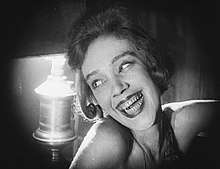Aleksandra Khokhlova
Aleksandra Sergeyevna Khokhlova (born Alexandra Sergeyevna Botkina, Russian: Александра Сергеевна Хохлова, 4 November 1897 – 22 August 1985) was a Russian actress, theatre director, writer, and educator.
Aleksandra Khokhlova | |
|---|---|
 | |
| Born | Alexandra Sergeyevna Botkina 4 November 1897 |
| Died | 22 August 1985 (aged 87) |
| Occupation | Actress, theatre director, writer, educator |
| Spouse(s) | Konstantin Khokhlov (m.1914, divorced) Lev Kuleshov (m.1923–1970; his death) |
| Children | 1 |
| Relatives | Pavel Tretyakov (grandfather) Sergey Botkin (grandfather) Mikhail Botkin (great-uncle) Vasily Botkin (great-uncle) Eugene Botkin (uncle) |
Life
.jpg)
The daughter of Sergei Botkin (1859–1910), a physician, and Alexandra Pavlovna Botkina (née. Tretyakova, 1867–1959), Alexandra Sergeyevna Botkina was born in Berlin, in what was then the German Empire. She had a sister, Anastasia,[1] and was the granddaughter of Pavel Tretyakov, a philanthropist and patron of the arts. In 1914, she married actor Konstantin Khokhlov. She appeared as a supporting actress in the 1916 film Uragan (Hurricane) directed by Boris Sushkevich and in the 1918 film Iola directed by Władysław Starewicz. In 1919, she passed the entrance exam for the State Institute of Cinematography in Moscow. There she met Lev Kuleshov who would become her partner in film and in life. Khokhlova appeared in the 1920 film Na krasnom fronte (On the Red Front) directed by Kuleshov; he also acted in the film, which combined archival footage with staged film sequences. Khokhlova's career in film was cut short when she fell out of favour because of her family's wealth and connections with Tsar Nicholas II.[2][3]
Besides acting and directing, Khokhlova also taught a workshop at the state institute with Kuleshov. In 1935, she was named a Merited Artist of the Russian Federation.[2]
With her husband, she published a memoir 50 Let v Kino (50 Years in Cinema).[3]
Khokhlova died in Moscow at the age of 87.[2]
Selected filmography[3]
Acting roles
- Zheleznaia Piata (The Iron Heel) (1919) directed by Vladimir Gardin
- Neobychainye prikliucheniia mistera Vesta v strane bolshevikov (The Extraordinary Adventures of Mr. West in the Land of the Bolsheviks), comedy (1924) directed by Lev Kuleshov
- Luch smerti (The Death Ray) (1925) directed by Lev Kuleshov, Kholhlova was also assistant director
- Po zakonu (By the Law) (1926) directed by Lev Kuleshov
- Vasha znakomaia (Your Acquaintance) (1927) directed by Lev Kuleshov
- Velikii uteshitel' (The Great Consoler) (1933) directed by Lev Kuleshov, Kholhlova was also assistant director
- Sibiryaki' (Siberians) (1940) directed by Lev Kuleshov
Directing
- Delo s zastezhkami (An affair of the clasps) (1929)
- Sasha (1930)
- Igrushki (Toys) (1933)
Assistant director
- My s Urala (We from the Urals) (1943), directed by Lev Kuleshov
References
- https://www.hermitagemuseum.org/wps/portal/hermitage/digital-collection/01.%20Paintings/177976/!ut/p/z1/04_Sj9CPykssy0xPLMnMz0vMAfIjo8zi_R0dzQyNnQ28_J1NXQwc_YMCTIOc_dwNDE30w8EKDHAARwP9KGL041EQhd94L0IWAH1gVOTr7JuuH1WQWJKhm5mXlq8fYWCopxCQmJlXkpmXXqwfYWhubmluBnRMFJpxnt7mQONCTD38_cOcjZxNoArwOKggNzSiysfDINNRUREAq6GE8A!!/dz/d5/L2dBISEvZ0FBIS9nQSEh/?lng=
- Rollberg, Peter (2016). Historical Dictionary of Russian and Soviet Cinema. p. 374. ISBN 1442268425.
- "Aleksandra Khokhlova". Women Film Pioneers Project. Columbia University.
External links
- Aleksandra Khokhlova on IMDb
- Aleksandra Khokhlova at the Women Film Pioneers Project